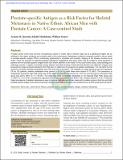Files in this item
Prostate-specific antigen as a risk factor for skeletal metastasis in native ethnic African Men with prostate cancer : a case control study
Item metadata
| dc.contributor.author | Qureshi, Ayman | |
| dc.contributor.author | Makhdomi, Khalid | |
| dc.contributor.author | Stones, William | |
| dc.date.accessioned | 2016-05-11T08:30:05Z | |
| dc.date.available | 2016-05-11T08:30:05Z | |
| dc.date.issued | 2017 | |
| dc.identifier | 240525593 | |
| dc.identifier | 1a3a480d-37f7-428a-83ba-c9e4a0f4d642 | |
| dc.identifier.citation | Qureshi , A , Makhdomi , K & Stones , W 2017 , ' Prostate-specific antigen as a risk factor for skeletal metastasis in native ethnic African Men with prostate cancer : a case control study ' , World Journal of Nuclear Medicine , vol. 16 , no. 1 , pp. 26-32 . https://doi.org/10.4103/1450-1147.181150 | en |
| dc.identifier.issn | 1450-1147 | |
| dc.identifier.uri | https://hdl.handle.net/10023/8771 | |
| dc.description.abstract | Prostate cancer is the commonest non cutaneous cancer in males. Men of African origin are at significantly higher risk as reflected in higher incidence and mortality rates in this racial group. Metastases incidence increases in parallel with serum levels of Prostate Specific Antigen (PSA), contributing significantly to morbidity and mortality. Staging of disease involves bone scans, which are sensitive in detecting skeletal metastases. Suggestions they may be omitted in some situations in patients with low prostate specific antigen levels, have drawn attention to the matter. In this case control study, using Radiology and Pathology records, a registry of prostate cancer patients recorded as being of Black African ethnicity was assembled. Images were presented to image reviewers blinded to the prostate specific antigen level, to determine presence of skeletal metastases. The risk factor for the outcome of interest (skeletal metastases) was prostate specific antigen level above 20ng/ml. Reliability of image reporting was also assessed. Of 122 patients, 50 (41%) had skeletal metastases, while these were absent in 72 (59%). The prevalence of metastases among the high prostate specific antigen group was 55.9% (95% CI 44.1% to 67.7%) and 22.2% (95% CI 11.1% to 33.3%) among the normal/low prostate specific antigen group. The Odds Ratio (OR) for skeletal metastases in the exposed (high prostate specific antigen) group was 4.4 (95% CI, 2.01 to 9.78.) Intra-observer agreement on image interpretation was 88.5% with a Kappa statistic of 0.76. Relatively higher prevalence of skeletal metastasis is seen in regional Black African males with prostate cancer, at both low and high prostate specific antigen levels. Bone scanning in this population should therefore be considered even at prostate specific antigen levels below 20ng/ml. | |
| dc.format.extent | 7 | |
| dc.format.extent | 827588 | |
| dc.language.iso | eng | |
| dc.relation.ispartof | World Journal of Nuclear Medicine | en |
| dc.subject | Bone scan | en |
| dc.subject | Native ethnic African | en |
| dc.subject | Prostate cancer | en |
| dc.subject | Prostate-specific antigen | en |
| dc.subject | Skeletal metastases | en |
| dc.subject | RC0254 Neoplasms. Tumors. Oncology (including Cancer) | en |
| dc.subject | NDAS | en |
| dc.subject | SDG 3 - Good Health and Well-being | en |
| dc.subject.lcc | RC0254 | en |
| dc.title | Prostate-specific antigen as a risk factor for skeletal metastasis in native ethnic African Men with prostate cancer : a case control study | en |
| dc.type | Journal article | en |
| dc.contributor.institution | University of St Andrews. School of Medicine | en |
| dc.contributor.institution | University of St Andrews. Global Health Implementation Group | en |
| dc.identifier.doi | 10.4103/1450-1147.181150 | |
| dc.description.status | Peer reviewed | en |
| dc.identifier.url | http://www.wjnm.org/preprintarticle.asp?id=181150;type=0 | en |
This item appears in the following Collection(s)
Items in the St Andrews Research Repository are protected by copyright, with all rights reserved, unless otherwise indicated.

